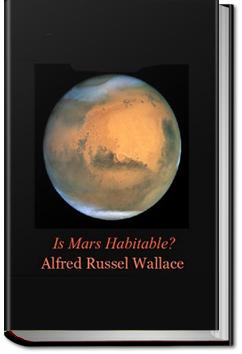UNLIMITED Audiobooks and eBooks
Over 40,000 books & works on all major devices
Get ALL YOU CAN for FREE for 30 days!
Is Mars Habitable?
Alfred Russel Wallace
Book Overview:
Wallace wrote the short book Is Mars Habitable? to criticize the claims made by Percival Lowell that there were Martian canals built by intelligent beings. Wallace did months of research, consulted various experts, and produced his own scientific analysis of the Martian climate and atmospheric conditions. Among other things Wallace pointed out that spectroscopic analysis had shown no signs of water vapor in the Martian atmosphere, that Lowell’s analysis of Mars’ climate was seriously flawed and badly overestimated the surface temperature, and that low atmospheric pressure would make liquid water, let alone a planet girding irrigation system, impossible. (from Wikipedia)
Wallace wrote the short book Is Mars Habitable? to criticize the claims made by Percival Lowell that there were Martian canals built by intelligent beings. Wallace did months of research, consulted various experts, and produced his own scientific analysis of the Martian climate and atmospheric conditions. Among other things Wallace pointed out that spectroscopic analysis had shown no signs of water vapor in the Martian atmosphere, that Lowell’s analysis of Mars’ climate was seriously flawed and badly overestimated the surface temperature, and that low atmospheric pressure would make liquid water, let alone a planet girding irrigation system, impossible. (from Wikipedia)
How does All You Can Books work?
All You Can Books gives you UNLIMITED access to over 40,000 Audiobooks, eBooks, and Foreign Language courses. Download as many audiobooks, ebooks, language audio courses, and language e-workbooks as you want during the FREE trial and it's all yours to keep even if you cancel during the FREE trial. The service works on any major device including computers, smartphones, music players, e-readers, and tablets. You can try the service for FREE for 30 days then it's just $19.99 per month after that. So for the price everyone else charges for just 1 book, we offer you UNLIMITED audio books, e-books and language courses to download and enjoy as you please. No restrictions.
[Footnote 4: In 1890 at Mount Wilson, California, Mr. W.H. Pickering's photographs of Mars on April 9th showed the southern polar cap of moderate dimensions, but with a large dim adjacent area. Twenty-four hours later a corresponding plate showed this same area brilliantly white; the result apparently of a great Martian snowfall. In 1882 the same observer witnessed the steady disappearance of 1,600,000 square miles of the southern s. . . Read More
Try now for FREE!

"Love your service - thanks so much for what you do!"
- Customer Cathryn Mazer
"I did not realize that you would have so many audio books I would enjoy"
- Customer Sharon Morrison
"For all my fellow Audio Book & E-Book regulars:
This is about as close to nirvana as I have found!"
- Twitter post from @bobbyekat



Community Reviews
A fascinating look at early thinking about astrobiology and the Martian canal debate from the late nineteenth and early twentieth century. The Victorian language and sometimes lengthy discussions probably don't lend themselves to casual reading, though.
The entirety of this books was picking apart someone else theory almost line for line and proving it wrong. Where as I am in agreement its wrong as it is an OLD theory, both are infact. I feel the book could have better been used to promote the author's own theory to stand on its own without attacki
The alternate/collaborator of Darwin. And When i read some Darwin i thought i should read something by Wallace. Interesting enough, and clearly correct as a refutation, but - through no fault of his - quite dated. It is impressive how fast humanity has gone from hardly being able to see Mars to bein
A bit dry, but it really helped me grasp just how brilliant the early 1900's scientists were. And they did it all with slide rules and on paper.
Amazing what was observable and deducible with such primitve equipment.
Wallace was one of the first to dispute Lowell's theory of civilized Mars, and he puts down Lowell hard. Planetary science is no place for those with thin skins!
(lido em Chengdu, China)
The Book "Is Mars Habitable?" is a scientific critique of Percival Lowell's conjectures that intelligent life exists or existed on Mars and built the canals. Lowell was an amateur astronomer, whereas Wallace is a professional scientist and a little more rigorous in his application of science to Mars